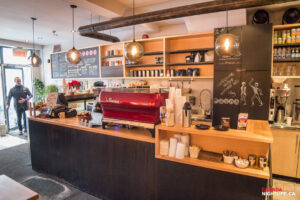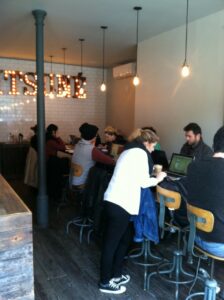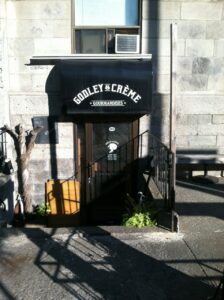
Culture shock hits the hardest when you least expect it. Everyone keeps these little assumptions they don’t even realize they have. Then, they come to a new country, and they’re shocked on two levels: one, is that they held an assumption they didn’t realize, and the other is that the assumption isn’t even true.
Anything less than that, and it’s not culture shock. Perhaps it’s more of a culture startle, or a light cultural jostling.
I keep seeing these coffee shops all around Montreal. As a big coffee drinker myself, I knew I’d have to make the rounds and figure out what local hangout would feel like home. I figured I’d start with the closest place, a little coffee shop and bakery just across the street. I went in, and practiced what little French I knew, ordering a typical black coffee. She responded in French, but I didn’t understand. Or maybe I did understand, and I just refused to believe it. She repeated, in English this time, to completely shatter any illusions I had.
“We don’t serve filtered coffee here.”
She pointed me towards the coffee menu. Sure enough, “Filtered” wasn’t on the list. Latte, espresso, cappuccino, even americano, but no filtered coffee.
This wasn’t a unique experience, either. I kept going to coffee shops, and kept getting the same response: They don’t have filtered coffee. They just do it differently up here, I guess. Everything is espresso based. This was probably my first big hit of culture shock.
Well, really, what’s the difference, right? I’m not going to pretend like espresso and filtered coffee are irreconcilably different drinks. Indeed, an americano is simply espresso with hot water, designed to emulate filtered, “American” coffee. I’ve been ordering coffee for so long, though, I’d kind of forgotten that espresso even exists, but up here it’s the filtered coffee that gets left behind. I’d assumed filtered coffee was everyone’s coffee beverage of choice, yet I move just 3 hours north and I find a whole country that couldn’t care less about it, and I’m once again reminded how easy it is to default to narrow-mindedness.
What an amazing opportunity. I’ve gone and explored all sorts of espresso bars and tried coffees I never would have thought to explore if I hadn’t been pushed into it. Yet, I knew that I’d need to get filtered coffee from a coffee shop somewhere in Montreal, or my experience just wouldn’t be complete, so I did some hands-on research.
If you find yourself in Montreal and need some black coffee, let me recommend Kitsune, just off St. Laurent and very close to the UQAM residence hall at which we’re staying. Good, convenient coffee, although it’s certainly a lighter roast than what I’m used to. But if you’re really serious, and you’re ready to take a hike for a good cup of coffee, I highly recommend heading up to the intersection of St. Urbaine and Rue Mount-Royal for the glorious Cafe Plume. At a 25-minute walk from the residence hall, it’s certainly not next door, but they really know how to make their coffee there. The beans themselves are actually imported from a roaster in Santa Cruz, interestingly enough.
Maybe you think I’m cheating by going to a coffee shop that gets their beans from the US. After all, it’s hardly exploring a new culture if I’m still getting my coffee from my country of origin. Well, I’ve opened my mind to the wonders of espresso, and I’m getting to like it more and more all the time. One of the great things about Montreal, at least for us native-born US citizens, is that it’s kind of like a blend between Europe and the US. I’m learning to like espresso more all the time, but I’m not going to suddenly stop loving the filtered coffee I’ve been drinking for years. Montreal offers a safe place to branch out without having to give up the culture you bring with you. I’m still a native-born US citizen, and I always will be, but I feel like I associate with Canada a bit more all the time.
– Scott Barrett, Game Programming Major, Official Blogger, Fall 2014

